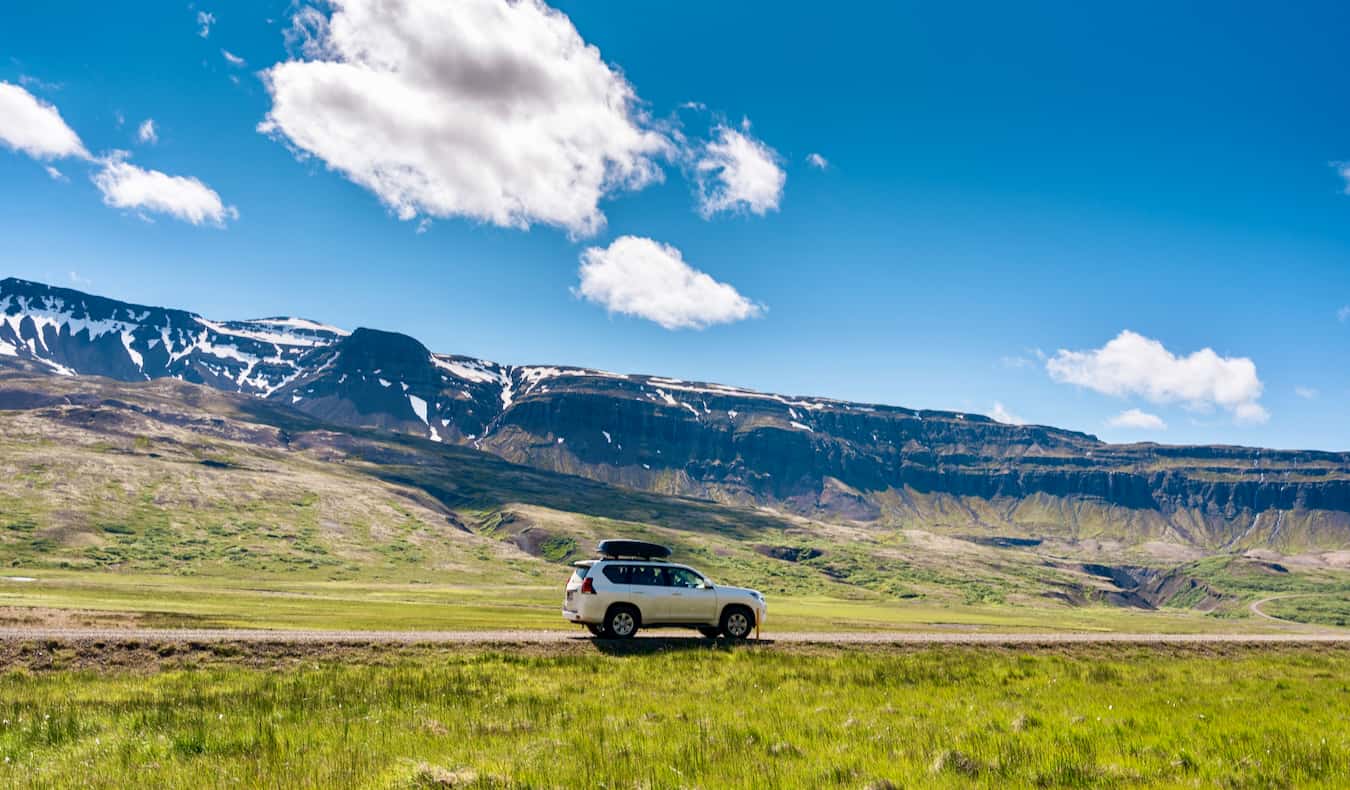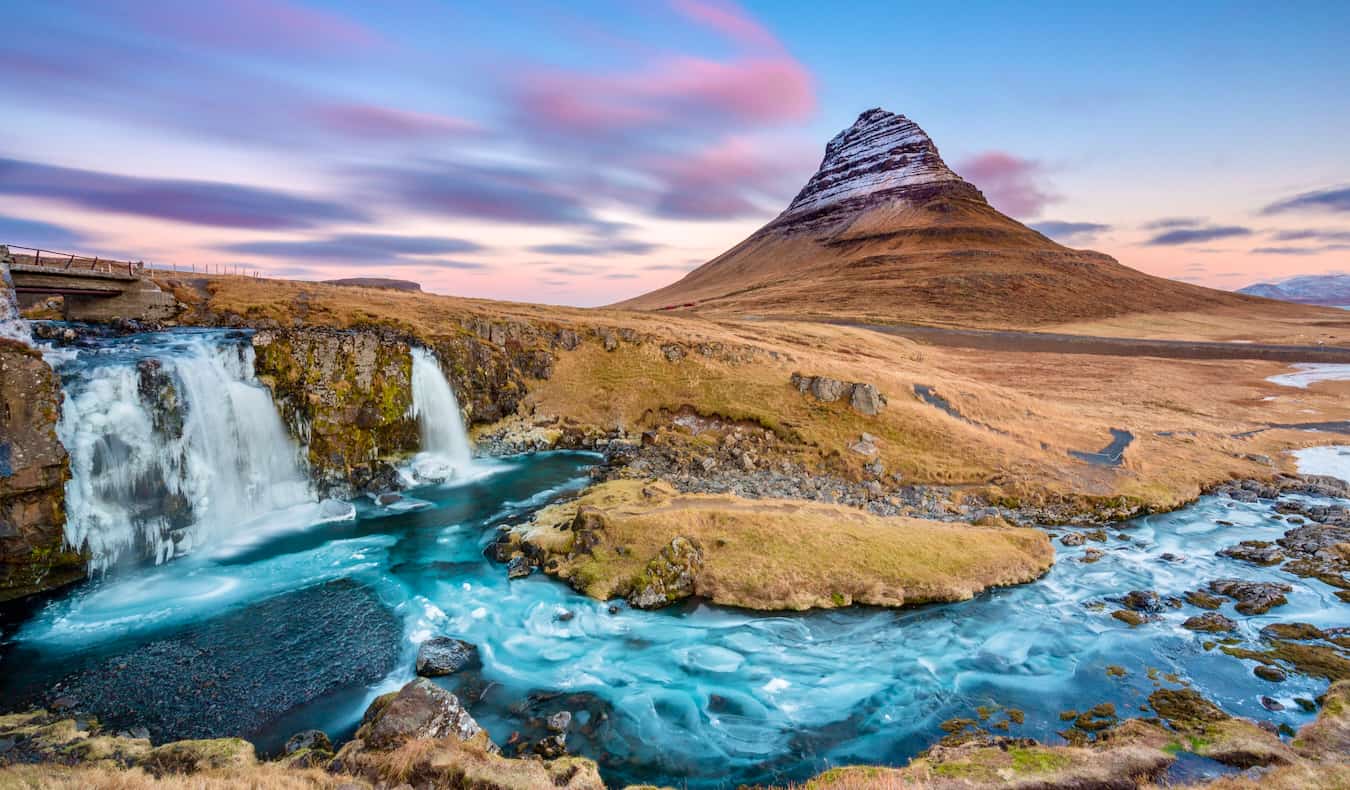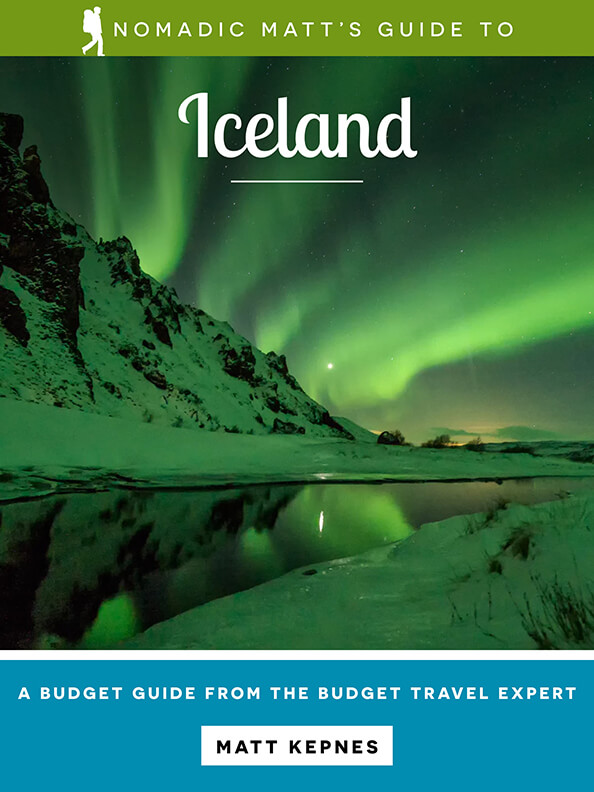
Posted: 4/2/2024 | April 2nd, 2024
Iceland is a magical country. It just feels out of this world, like you’re on another planet. The rugged volcanoes and black-sand beaches give the island a desolate but striking appearance. If you ask me, it’s right up there with New Zealand and Norway in terms of the most beautiful countries in the world.
And, just like both of those destinations, it’s an amazing place to take a road trip.
Thanks to its stunning natural beauty, safety, and ease of transportation, Iceland has become a popular destination for solo travelers and first-time road trippers. Yes, it can be expensive, but it has so much to see and do, including tons of amazing hikes and waterfalls that are free to enjoy. You don’t need to break the bank here.
Having been to Iceland a handful of times over the years, I think taking a road trip is the best way to explore the country. So, to ensure you save time and money and stay safe during your trip, here are my top 13 Iceland road-trip tips:
1. Make sure you have car insurance
I never leave home without travel insurance. And I never rent a car without comprehensive auto insurance either.
In most destinations, this might seem like overkill. I mean, how often do you actually use your car insurance?
In Iceland, however, the weather changes often — and drastically.
Rain and snow are common, and gravel and sand often damage windows. But the real threat most drivers aren’t prepared for is the wind. The gusts here are so strong that car doors are regularly ripped off their hinges (every time I’ve rented a car here, the company has reminded me of this).
Combine that with winding, narrow roads and an abundance of active volcanoes, and you’ve got yourself a recipe for car trouble.
That’s why I always recommend travelers have comprehensive car rental coverage when they visit Iceland. Because it’s much better to be safe than sorry here!
When it comes to renting a car, I recommend Discover Cars. When you book, it’s super easy to add car insurance onto your purchase with the click of a button. They make it clear what is covered and how much it costs.
You can use the widget below to get a quote. It’s fast and free:
2. Rent the right vehicle
It’s easy to rent a car in Iceland. You don’t need an International Driving Permit if you have a valid license using Latin letters with a license number, photograph, and expiration date. That means Americans, Canadians, Australians, Brits, and New Zealanders can all rent a car here with their regular license.
When renting a vehicle in Iceland, you have three main choices:
- A car
- A 4×4 (4WD)
- A van/RV
If you’re just planning to see the main sights while sleeping in hostels, hotels, and/or Airbnbs, a regular car will do the trick. It’s the cheapest option too.
If you want to explore the rugged interior (known as the Highlands), a 4×4 is required, since the roads there are often unpaved, gravel ones called “F-roads,” which can only be traversed by 4×4 vehicles (if you drive a regular car on them, your insurance coverage will be void).
Your final choice is a campervan/RV. These are for travelers who want to sleep in their vehicle as they travel. They are the most expensive option, but you’ll save money on accommodation, so it kind of balances out.
Just keep in mind that standard transmissions are the norm here, so reserve an automatic-transmission vehicle if that’s a requirement for you.
(Note: No matter what type of vehicle you have, never drive off-road. It is highly illegal due to the fragility of Iceland’s ecosystem. Not only does off-roading damage this beautiful environment, but you could face stiff fines if caught.)
3. Download the right apps
Everyone road-tripping around Iceland should have the following apps downloaded to or websites bookmarked on their phone:
- Google Translate – While English is widely spoken, the app can be helpful for reading signs and directions. Just make sure to download Icelandic for offline use so that you can still translate things even without mobile data.
- Google Maps – The best app for looking up directions. Make sure to download your maps so you have them for offline use.
- Safetravel.is – This app shares weather alerts, road closure information, and more. It’s good to have so you can be kept up to date should inclement weather or emergencies arise.
- Vedur.is – This is the best weather app for Iceland.
- Samferda – This website is great for finding passengers if you want to share a ride with someone. (If you’re a passenger and need a ride, you can post here too.) Another helpful site for finding passengers is Couchsurfing.
Check the international policies and charges on your phone plan before leaving, so as to avoid unexpected charges when using these apps and/or websites. If you want to stay connected with unlimited data on your trip, get an eSIM.
4. Bring a paper map
Whenever I go on a road trip, I always bring a paper map. I know, Google Maps is easy and free, and mobile data coverage in Iceland is reliable. But it’s better to be safe than sorry. You never know when your phone is going to break, if your signal will be lost, or there will be an emergency.
Give yourself peace of mind: bring a paper road map with you, and just leave it in the glove box. You likely won’t need it, but if you do, you’ll be glad you have it!
5. Choose your direction wisely
The vast majority of travelers road-tripping through Iceland drive the Ring Road (aka Route 1, the country’s main highway) counterclockwise. This allows you to start with the famous Golden Circle and then head toward popular sights like the Skógafoss and Seljalandsfoss waterfalls, the Sólheimasandur crash site, the glacier lagoon, and more. If you only have a few days to explore, this is the best direction to choose. If it’s your first-time visiting Iceland, this is the direction I suggest.
However, if you want to be contrarian or you want to get off the beaten path, head clockwise. There are still some sights you can visit to kick things off, such as the postcard-perfect Mount Kirkjufell and the rugged Snæfellsnes Peninsula.
If you really want to get off the beaten path and beat the crowds, head to the Westfjords. Only a fraction of travelers come here, so it’s home to some of the most unspoiled landscapes in the country. It was also the highlight of all my time in Iceland.
6. Avoid the F-roads (if you have a car)
As mentioned above, F-roads are rugged, unpaved routes that generally lead off the main Ring Road into the interior. Driving on these roads requires a 4×4 (4WD). If you have a regular car, you won’t be permitted to drive on them. You will void your insurance coverage while also risking blowing a tire or damaging the car. It’s not worth it!
7. Check the weather often
I’ve said it before and I’ll say it again: the weather in Iceland changes rapidly. For that reason, you’ll want to keep an eye on the forecast. While driving in wind or rain might not be an issue, if you’re planning to get out and hike or visit some of the waterfalls, you’ll want to make sure you’re prepared for the weather. The Vedur.is app (mentioned above) is a must.
No matter what time of year you visit, bring rain gear (including a hat), waterproof footwear, and a sweater. Even in the summer, Iceland is rarely hot, and rain isn’t uncommon either. Prepare accordingly so your trip isn’t ruined (especially if you plan on hiking).
8. Only pull over where there is space
You are going to be tempted to stop your car often to take photos. And I mean really often. Not only are the main sights in Iceland awe-inspiring, but the average sights are stunning too. You’ll come across random vistas and waterfalls, craggy moss-covered hills, black-sand beaches, and so much more.
It will be tempting to pull over to get out and take photos, but do so with caution. Try to pull off the road only at designated stops or where there is room to do so without impeding traffic. While the Ring Road isn’t a superhighway, it is a busy route with regular traffic in both directions. Don’t endanger yourself or others for a photo. Stick to designated stopping areas.
9. Keep an eye on your gas tank
Once you leave the busier part of the island around Reykjavik, gas stations become few and far between. For that reason, you’ll want to fill up when you can. Don’t just wait until you have a quarter tank, as you might run out of gas before you get to the next station.
While you can generally look up where gas stations are via Google Maps, I always make sure to top up when I can. The peace of mind is worth it. You’ll also be covered in case you get delayed or change your travel plans at the last minute.
10. Don’t rush
A lot of people think that, because Iceland is small, you can see the sights in just a matter of days.
You can’t.
If you’re looking to drive the entire Ring Road, plan for at least 10-14 days. While you can do it in less, you will be rushed and will spend more time driving than I’d recommend. (If you just want to see the main highlights in the south and east, 5-7 days is sufficient.)
I prefer quality over quantity, so I always suggest travelers slow down and really soak in the sights. You won’t regret it.
If you’re looking for recommended itineraries, this post breaks down all my suggestions for different time frames, all the way up to an entire month.
11. Avoid the summer (and also the winter)
Iceland suffers from success. The country is swamped by travelers during the summer, between late June and early August, as that is when the weather is the warmest and the days are the longest. While “busy” in Iceland is a far cry from “busy” in cities like Barcelona or Venice, it can still be crowded around Reykjavik and the sights closest to the city.
For that reason, I suggest visiting in the shoulder season. The weather is still warm and there will be far fewer people. Everything will be a little cheaper too.
If you are set on going in the summer, I’d suggest heading off to the Westfjords. It’s the least-visited area of the country and offers some of the most untamed and beautiful landscapes in Iceland.
Additionally, I suggest avoiding winter visits too if you plan on driving. Road conditions are less than ideal, and snowstorms are frequent. Unless you have lots of experience with winter driving, skip that season. (You can definitely do a winter visit to see the northern lights, I just wouldn’t rent a car for that.)
Personally, I think late May to early June and late August to early September are the best times to visit. Prices are cheaper, the weather is decent, and the crowds are thinner.
12. Pick up passengers
If you’re traveling on a budget, consider taking passengers. Having people chip in for gas for a leg or two of your journey is a great way to save money while also connecting with like-minded travelers. As mentioned above, you can use websites like Samferda or Couchsurfing to find them.
Another option is to pick up hitchhikers. In the warmer months, hitchhiking is super common along the Ring Road (I hitchhiked here and had a great experience). While they generally don’t have money to contribute, they likely have cool stories and great tips. It’s an easy way to help other travelers and liven up your own trip.
13. Follow the rules of the road
Being a responsible traveler means following local norms and laws. Be aware that Iceland has stricter driving laws and penalties than you may be used to. Make sure to do the following:
- Never drive off-road. Respect the fragile Icelandic ecosystem and never drive off-road.
- Never drink and drive. Iceland has very strict laws about driving under the influence (0.02% is the limit). Not only are you endangering yourself and others, but the fines are extremely high (100,000 ISK).
- Never use your phone while driving. Use a hands-free setup if you need to talk and drive, or else pull over. Not only is it dangerous, but you could face high fines as well.
- Watch out for others on the road. This includes sheep (there are more sheep than people here) and cyclists. Pass slowly and give them a wide berth.
- Know who to call. If you experience an emergency, dial 112 for assistance. It’s the equivalent of 911 in the US/Canada.
Iceland Road Trip FAQ


How difficult is a road trip in Iceland?
Iceland is one of the easiest countries in the world for a road trip. The reason is that there is essentially just one long road that circles the country (known as Route 1, or the Ring Road). That makes it quite easy to get around and difficult to get lost.
How long do you need to road-trip around Iceland?
If you plan to drive the entire Ring Road, you’ll want at least 10 days (14 days would be better). If you just want to see the main sights in the south and east, 5-7 days should be plenty.
Is Iceland very expensive?
Iceland can be very expensive. Food, accommodation, rental cars, and gas are all pricey. However, there are plenty of ways to save too. By sharing a vehicle (and splitting costs), cooking all your meals, and camping or sticking to hostels, you can easily do it for under $100 USD per day.
Is it worth renting a 4×4?
I would only rent a 4×4 if you have prior road trip experience and are planning to go off road. For the average visitor looking to see the main sights, a 4×4 is not necessary.
What is an F-road?
An F-road is a route on which only 4×4 vehicles can travel. They are very rugged, unpaved roads, generally leading you into the interior.
If you have a regular rental vehicle, you’re forbidden to drive on them.
Is it safe to drive solo in Iceland?
Iceland is consistently ranked as one of the safest countries in the world. If you’re new to solo travel, it’s the perfect place to start.
Iceland is one of the most beautiful countries in the world. It’s also one of the best (and easiest) places to do a road trip. While it may be expensive, it’s very safe and easy to get around, and there are lots of free things to see and do to keep costs down. Just follow the tips above, and you’ll have a fun and safe visit to this rugged island nation!
Get the In-Depth Budget Guide to Iceland!


Want to plan the perfect trip to Iceland? Check out my comprehensive guide to Iceland written for budget travelers like you! It cuts out the fluff found in other guides and gets straight to the practical information you need. You’ll find suggested itineraries, tips, budgets, ways to save money, on and off the beaten path things to see and do, and my favorite non-touristy restaurants, markets, bars, transportation tips, and much more! Click here to learn more and get your copy today.
Book Your Trip to Iceland: Logistical Tips and Tricks
Book Your Flight
Use Skyscanner to find a cheap flight. They are my favorite search engine because they search websites and airlines around the globe so you always know no stone is left unturned.
Book Your Accommodation
You can book your hostel with Hostelworld as they have the biggest inventory and best deals. If you want to stay somewhere other than a hostel, use Booking.com as they consistently return the cheapest rates for guesthouses and cheap hotels.
Don’t Forget Travel Insurance
Travel insurance will protect you against illness, injury, theft, and cancellations. It’s comprehensive protection in case anything goes wrong. I never go on a trip without it as I’ve had to use it many times in the past. My favorite companies that offer the best service and value are:
Looking for the Best Companies to Save Money With?
Check out my resource page for the best companies to use when you travel. I list all the ones I use to save money when I’m on the road. They will save you money when you travel too.
Want More Information on Iceland?
Be sure to visit our robust destination guide to Iceland for even more planning tips!













